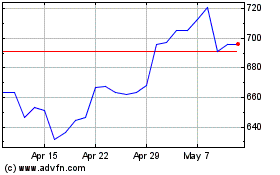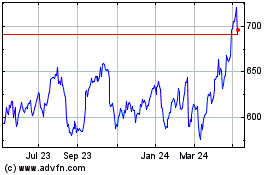HSBC Stock Hits 25-Year Low -- 2nd Update
September 21 2020 - 2:23PM
Dow Jones News
By Frances Yoon
HSBC Holdings PLC stock sank to a 25-year low as it came under
pressure on three fronts, highlighting the difficulty of the bank's
geopolitical balancing act.
Chinese state media over the weekend warned the British lender
could face restrictions on its business in China, adding to a
squeeze on the stock after reports said HSBC and other banks
overlooked instances of money laundering and that its home U.K.
market could go into a second lockdown to counter rising
coronavirus cases.
HSBC for decades navigated political faultlines as a
London-based bank making most of its profits in Asia and clearing
dollars for companies across the world for global trade. It is
caught in the middle now of rising tensions between the U.S. and
China over trade and the status of Hong Kong. In the U.K., its
large domestic bank is ratcheting up loan loss provisions to cover
coronavirus-related defaults.
Investors are concerned HSBC could be put on an "unreliable
entities" list in China that would threaten the bank's growth plans
in retail banking and in the country's securities markets. Over the
weekend, China's Ministry of Commerce said such entities could face
limits on investment and staff in China. It hasn't designated any
businesses in this way yet, but China's state-owned Global Times
tabloid said many media reports had named HSBC as a candidate.
HSBC has been present in China since its 1865 founding in Hong
Kong and Shanghai, and runs the country's largest foreign-owned
branch network. It angered Chinese authorities when it shared
information about Chinese telecommunications equipment company
Huawei Technologies Co. with U.S. prosecutors in 2016. HSBC said it
responded to formal demands and didn't seek to harm the company,
whose finance chief faces charges in the U.S. for allegedly
misleading HSBC and other banks about ties between Huawei and an
affiliated company doing business in Iran.
In the U.K., government scientific advisers said coronavirus
cases could rise steeply if action isn't taken, and indicated the
public should prepare for six months of restrictions.
Meanwhile, on Sunday, BuzzFeed News, the International
Consortium of Investigative Journalists, and partner media
organizations published reports Sunday citing documents leaked to
BuzzFeed that included more than 2,100 reports filed by financial
institutions with the U.S. Treasury Department's Financial Crimes
Enforcement Network suggesting that HSBC and other banks may have
facilitated crime due to lax controls.
HSBC said "all of the information provided by the ICIJ is
historical" and predated the Justice Department's conclusion in
2017 that it had met commitments under a five-year deferred
prosecution pact. The bank said it spent years overhauling its
financial crime controls, and "is a much safer institution than it
was in 2012."
The reports, and wider jitters in global stock markets Monday,
pushed the stock down 5% and also weighed on HSBC's bonds. Jérôme
Legras, head of research at Axiom Alternative Investments, said a
move in the lender's riskiest bonds, which can convert to equity in
distress, was significant and reflected investors' concerns. The
bank has one of the strongest capital ratios in Europe, a measure
of its financial strength, at 15% at June 30.
Tom Kinmonth, a fixed income strategist at Dutch bank ABN AMRO
Bank NV, said bonds of U.K. banks Barclays, Standard Chartered and
HSBC were all facing some pressure Monday following the news
reports, which were based on a trove of documents called suspicious
activity reports.
Tom Kinmonth, a fixed-income strategist at Dutch bank ABN AMRO
Bank NV, said bonds of U.K. banks Barclays PLC, Standard Chartered
PLC and HSBC were all facing some pressure Monday after reports
they may have facilitated crime in news articles based on a trove
of suspicious activity reports.
Stocks of other banks cited in the news articles on suspicious
transactions, such as Barclays, Deutsche Bank AG and JPMorgan Chase
& Co., also fell.
Shares of HSBC and many other banks have tumbled this year, as
the coronavirus pandemic has wreaked economic damage and forced
central banks to slash interest rates, which damages banks'
profits.
Mr. Kinmonth noted that the market capitalizations of the banks
in the Stoxx Europe 600 Banks index are at their lowest since the
depth of the financial crisis in 2009, meaning they are trading at
a fraction of their net worth.
The depressed share prices make it harder to tap investors for
more capital, and some lenders are beginning to consider mergers as
a way to cut out costs and give a better return to
shareholders.
Last month, HSBC said net profit plummeted 96% to $192 million
in the second quarter as the impact of the pandemic complicated its
efforts to refocus on Asia while dealing with rising U.S.-China
political tensions.
In March, the Bank of England directed HSBC and other banks to
cancel 2019 dividends to shore up their capital buffers. The move
angered some smaller investors in Hong Kong who held the stock
largely for regular dividend income.
Patricia Kowsmann and Yifan Wang contributed to this
article.
Write to Frances Yoon at frances.yoon@wsj.com
(END) Dow Jones Newswires
September 21, 2020 14:08 ET (18:08 GMT)
Copyright (c) 2020 Dow Jones & Company, Inc.
Hsbc (LSE:HSBA)
Historical Stock Chart
From Mar 2024 to Apr 2024

Hsbc (LSE:HSBA)
Historical Stock Chart
From Apr 2023 to Apr 2024
